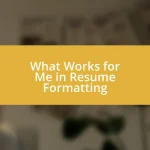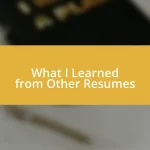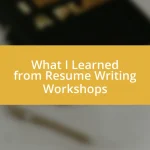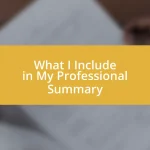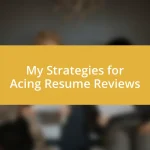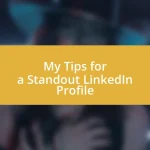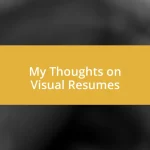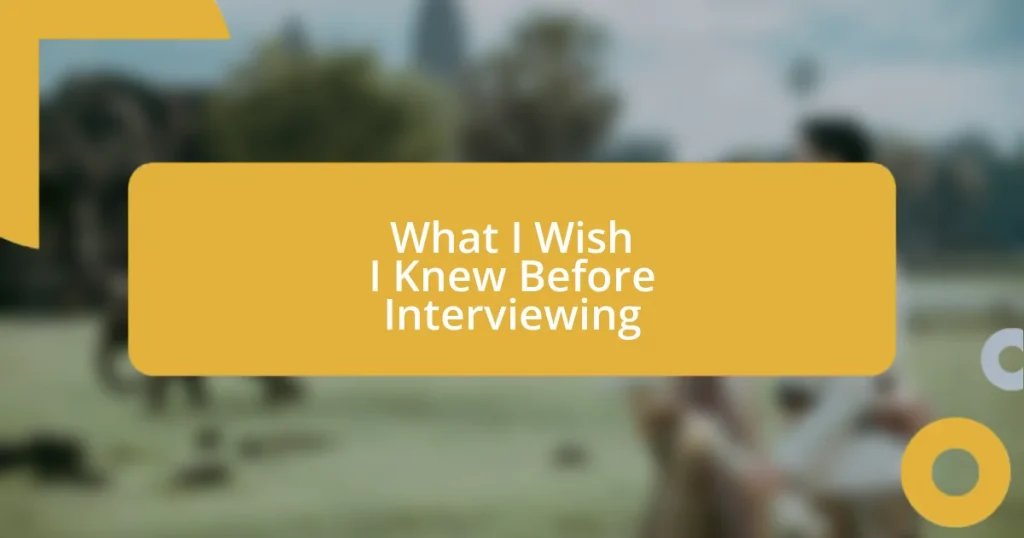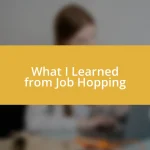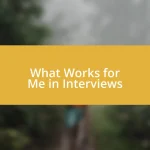Key takeaways:
- Thorough research on the company fosters meaningful conversations and shows genuine interest.
- Utilizing the STAR method for storytelling allows candidates to present structured, engaging narratives that highlight their skills.
- Effective follow-up communication, such as personalized thank-you notes, reinforces enthusiasm and professionalism post-interview.
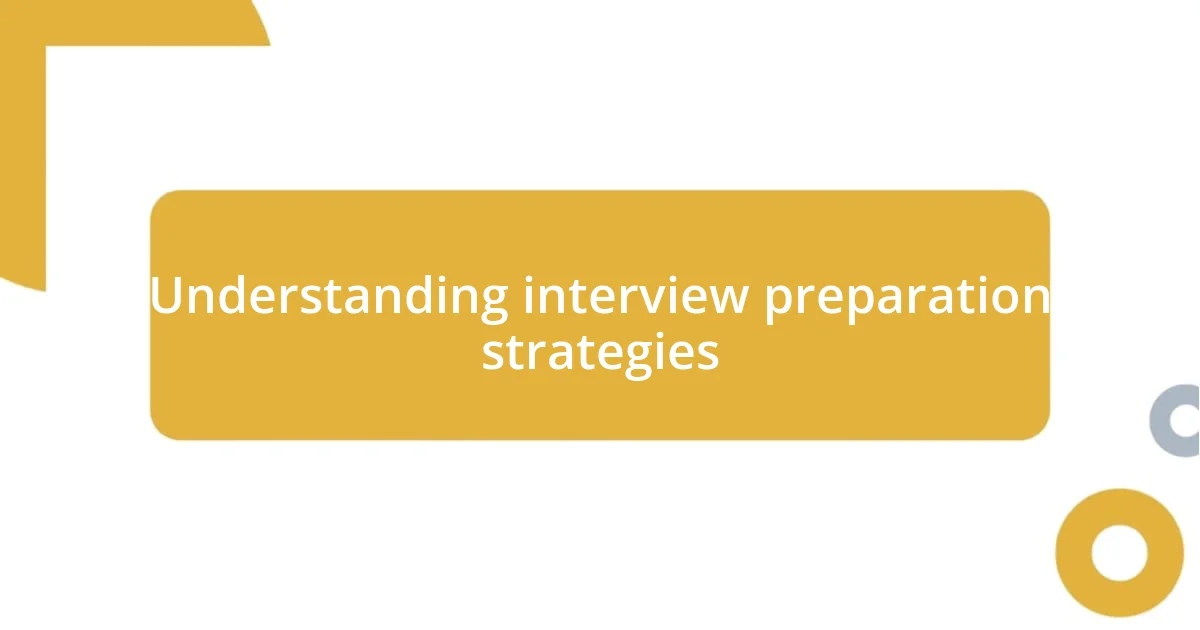
Understanding interview preparation strategies
When I first started interviewing, I barely scratched the surface of what preparation truly meant. I remember one time going into an interview with only a basic understanding of the company, which felt like walking into a date without knowing the person’s name. It’s crucial to dive deep into researching the company’s culture, mission, and recent accomplishments. What do you really know about your potential employer?
One preparation strategy that I found invaluable was practicing common interview questions with a friend. Initially, I thought going solo was enough, but hearing how others perceived my responses opened my eyes. It made a big difference to receive feedback and refine my answers while gaining confidence. Have you ever tried role-playing an interview?
Another tip is to create a tailored list of your experiences that align with the job description. I once overlooked this practice and ended up fumbling over my qualifications when it mattered most. By framing my skills in relation to the specific role, I found that I could communicate my value more effectively. Remember, interviewers are not just looking for skills; they’re eager to understand how you fit into their vision.
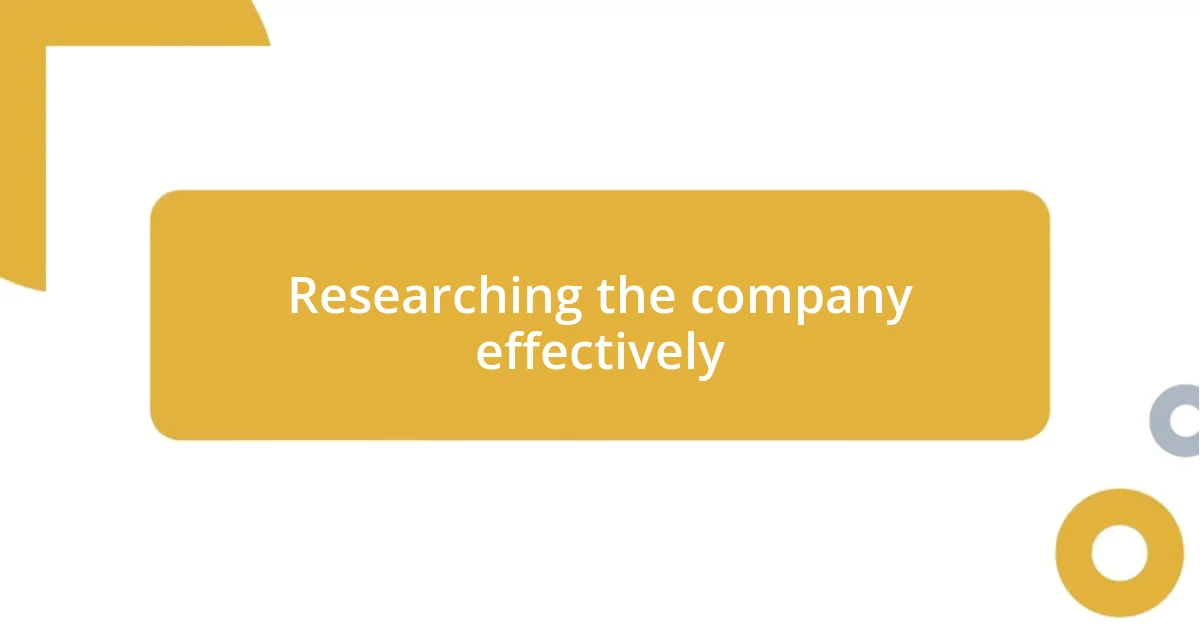
Researching the company effectively
When I think back to my early interviews, I realize that my limited company research often led to missed connections during discussions. I recall one particular interview where I failed to mention a recent project the company was proud of—an oversight that felt embarrassing when the interviewer brought it up. Understanding the company’s industry position, values, and recent news not only prepares you for poignant conversations but also highlights your genuine interest in the role.
To make your research effective, consider these strategies:
– Visit the company’s website: Focus on their mission statement and values.
– Explore their social media profiles: Check their latest updates, community involvement, or projects.
– Use platforms like Glassdoor: Read employee reviews for insights on company culture.
– Look at news articles: Discover what the industry is saying about them lately.
– Network with current or former employees: Real-life experiences can provide invaluable perspectives.
Despite the time investment, each bit of research enriches your dialogue and showcases your commitment. It’s like preparing for a significant conversation; the more you know, the more engaged and confident you’ll feel.
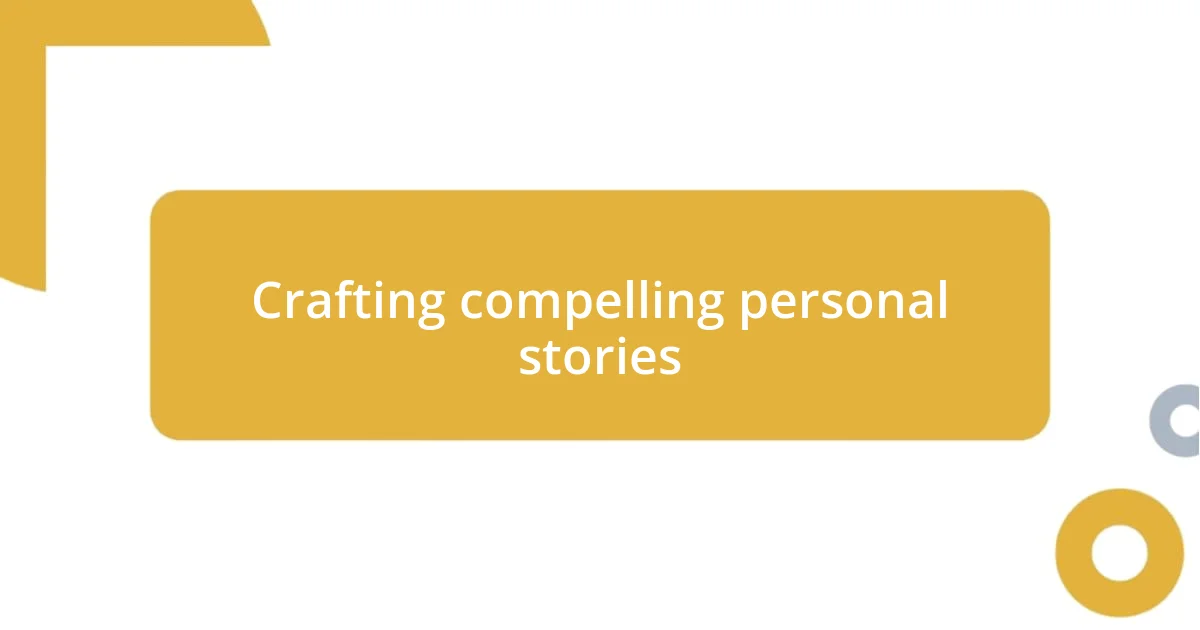
Crafting compelling personal stories
Crafting compelling personal stories can truly set you apart in an interview. I remember a time when I shared a personal experience that illustrated my problem-solving skills. Instead of simply stating my ability to troubleshoot, I described a specific incident where I handled a challenging client situation. The interviewer’s eyes lit up, and that small anecdote led to a deeper conversation. Have you thought about how your stories can be your unique selling points?
One of my favorite strategies for storytelling is the STAR method—Situation, Task, Action, Result. I often tried to weave this framework into my responses, making my stories both structured and impactful. For example, explaining how I organized a last-minute team project not only highlighted my leadership skills but also showed my ability to keep calm under pressure. Do you have a memorable success story that resonates with your professional journey?
Additionally, I noticed that weaving in some emotional elements makes my stories more relatable. I shared a moment when I faced a setback and had to pivot my approach. The vulnerability of that experience struck a chord with interviewers, as it allowed them to see my resilience. Authenticity in storytelling is key—when you share your journey, it creates an atmosphere of trust and connection.Survey your experiences for stories that not only showcase your skills but also invite emotional engagement.
| Story Element | How to Implement |
|---|---|
| Personal Experience | Share a relevant anecdote to illustrate your skills. |
| STAR Method | Use a structured approach to convey your message clearly. |
| Emotional Insight | Include personal emotions to create relatability. |
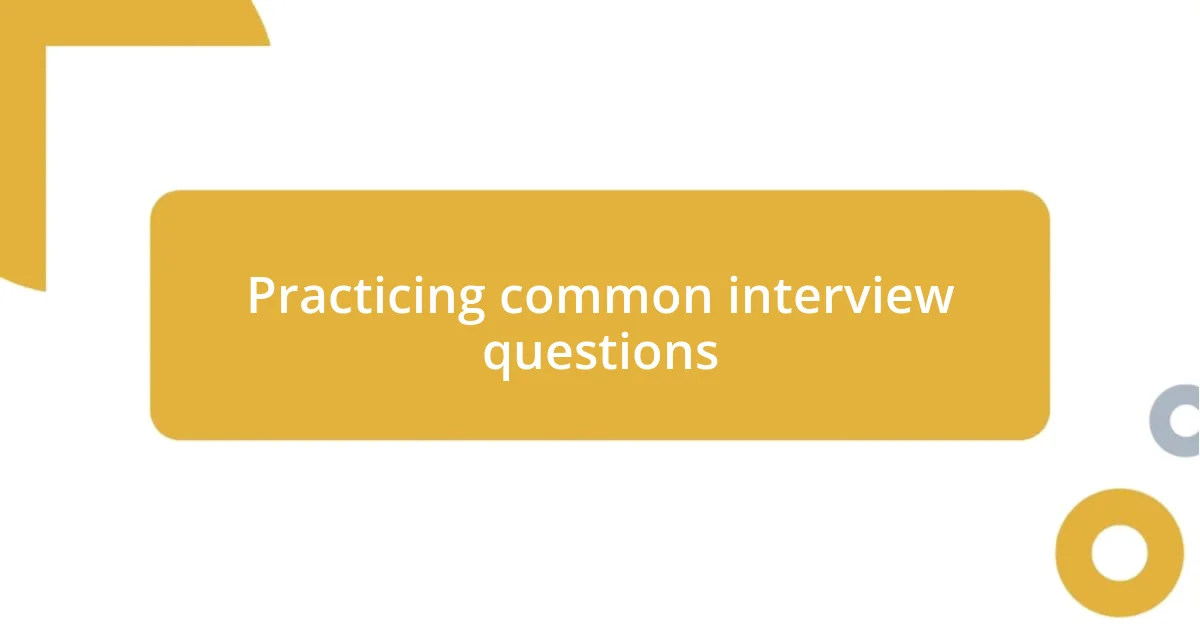
Practicing common interview questions
Practicing common interview questions is essential for feeling prepared. I remember the nerves I faced before an interview, often wondering how I would tackle the “Tell me about yourself” question. To overcome this, I started practicing my answers out loud, which not only helped me articulate my thoughts better but also made me more comfortable with my own story.
One technique that worked wonders for me was sitting down with a friend or mentor and conducting mock interviews. During one such session, I stumbled through an answer about a strength of mine. The constructive feedback I received helped refine my response to be concise and impactful. Have you ever thought about how a few trial runs can reveal strengths and weaknesses in your delivery?
In my experience, being familiar with potential questions isn’t just about memorizing answers; it’s about internalizing the narrative. When I practiced for an interview at a tech company, I focused on showing my passion for innovation rather than listing skills. This shift in mindset turned those common questions into opportunities for genuine conversation, allowing me to connect with the interviewer on a more personal level. How do you think your approach to these questions could change the way you present yourself?
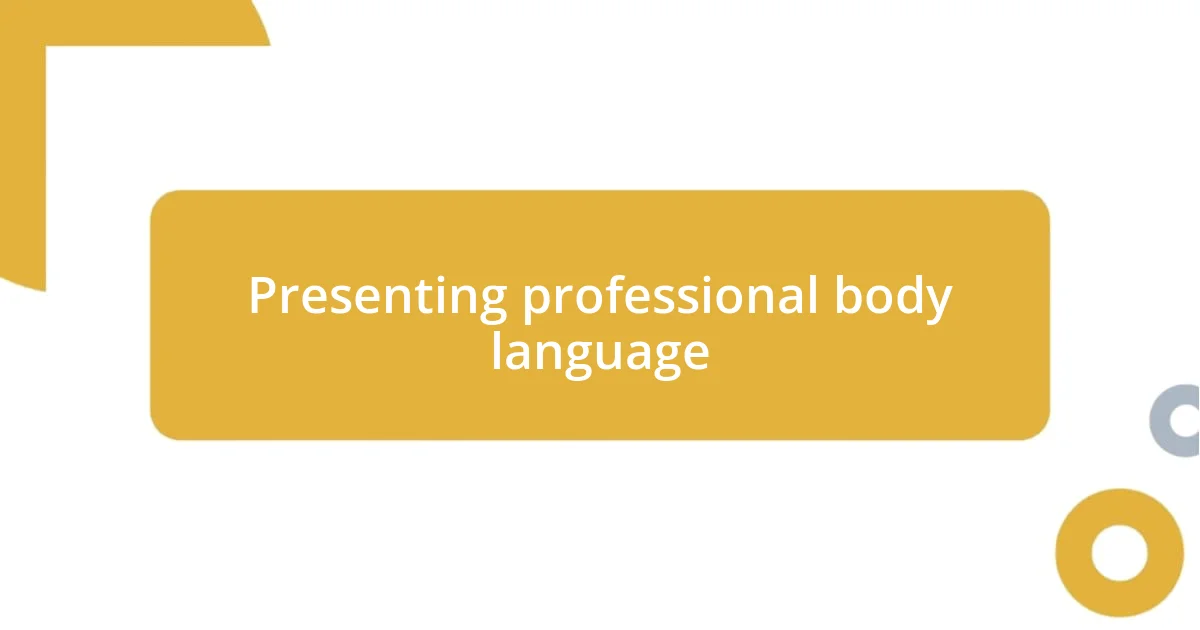
Presenting professional body language
When I think about the importance of body language in an interview, I can’t help but recall a pivotal moment from my own experience. I used to fidget nervously, but I learned that maintaining eye contact and sitting up straight can dramatically change how an interviewer perceives you. It’s amazing how simple adjustments, like uncrossing your arms, can convey openness and confidence. Have you ever noticed how a candidate who radiates poise instantly captures an interviewer’s attention?
There was a time when I was interviewing for a role that felt immensely important to me. I deliberately focused on my posture and gestures to project confidence. As I spoke about my experiences, I consciously nodded and smiled to engage the interviewer. The energy in the room shifted, and I could tell my positive body language was making an impression. How often do you consider the silent messages you send without saying a word?
In my journey, I discovered that practicing body language in front of a mirror helped me refine my approach. I would rehearse my answers while being aware of how I looked—watching for those subtleties, like a firm handshake or an enthusiastic smile. This kind of preparation not only improved my body language but also eased my nerves on the big day. Just think how your awareness of body language could elevate your interview presence!
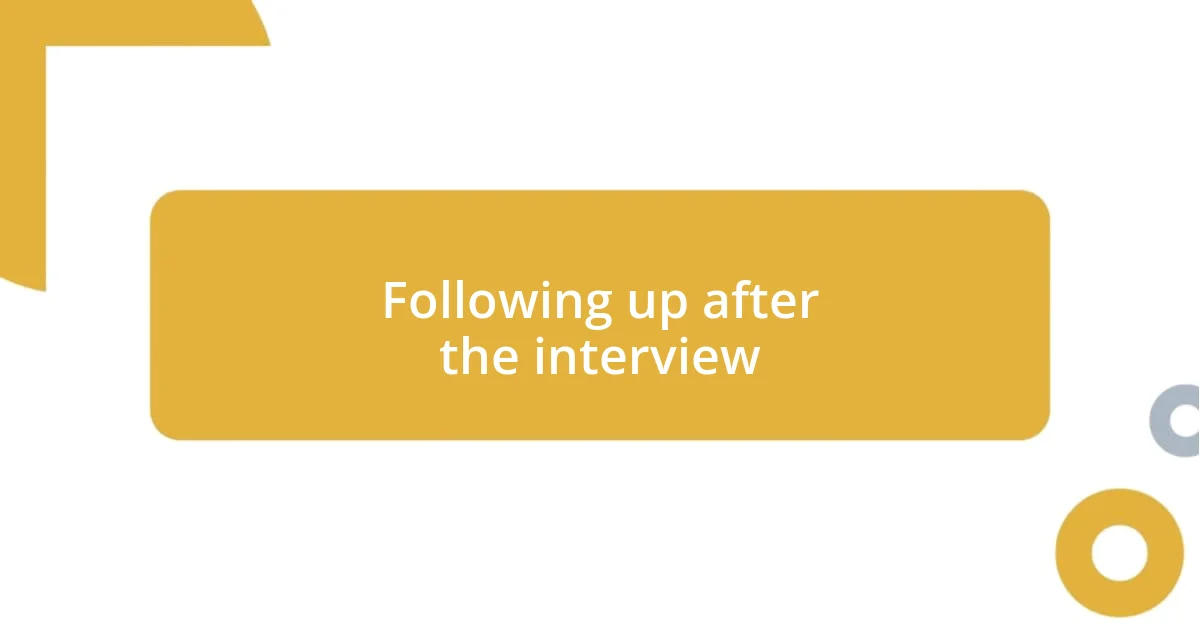
Following up after the interview
I learned that following up after an interview can make a significant difference in how you’re perceived. After my first few interviews, I decided to send a thank-you email to the interviewer, expressing gratitude for their time and reiterating my interest. It felt like a small gesture, but I later found out it subtly reinforced my enthusiasm and professionalism. Have you ever thought about how a simple note can set you apart from other candidates?
As I continued my job search, I found it beneficial to not only thank the interviewer but also to reference specific points discussed during our conversation. This approach shows genuine interest and helps keep the dialogue fresh in their minds. In one instance, I mentioned a project we talked about and shared a relevant article I found. The response was positive, and it made me realize how impactful a personalized follow-up can be. What strategies do you think you could implement in your own follow-up?
Timing is crucial when it comes to following up. I once waited a full week to reach out, and I felt a mix of hope and anxiety during that time. Ideally, I wish I had sent a brief email within 24 hours of the interview to maintain that connection while it was still fresh. Learning to balance eagerness with professionalism has been key, and I believe making that effort demonstrates your genuine interest in the position. How will you prioritize your follow-up communications after your next interview?
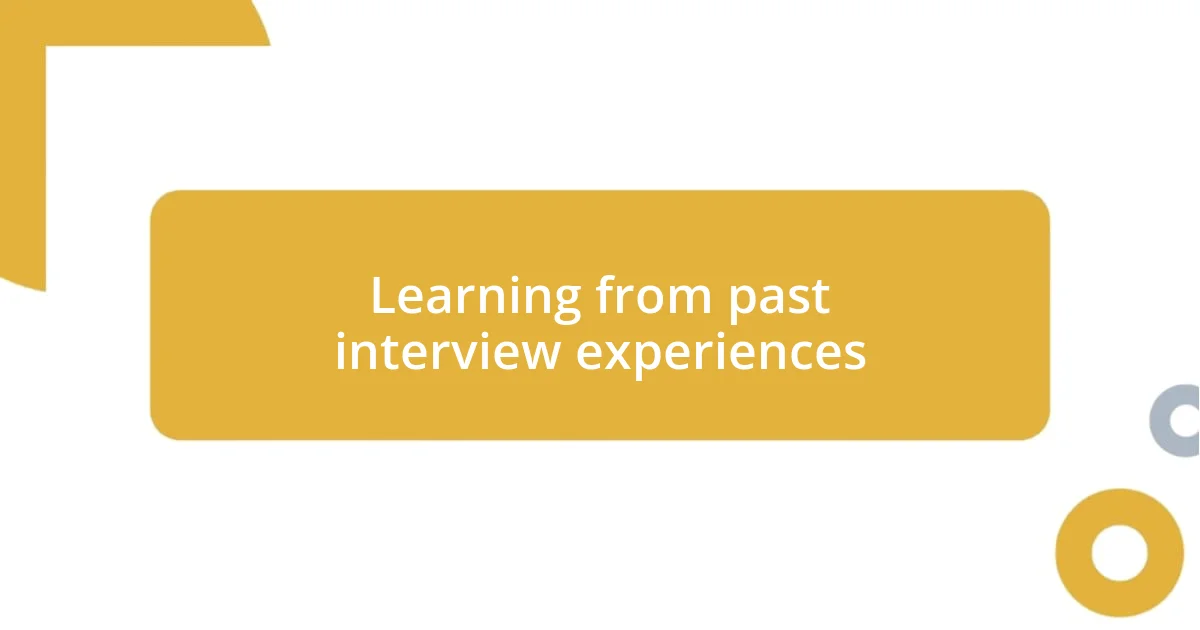
Learning from past interview experiences
Reflecting on my previous interviews, I’ve realized that each experience held valuable lessons that shaped my approach. I once walked out of an interview feeling defeated after stumbling over a tough question. But that moment prompted me to embrace every opportunity to practice under pressure. I found that simulating tough questions with friends transformed my confidence—have you ever put yourself in a hot seat to really test your skills?
Another notable interview made me appreciate the power of storytelling. I remember sharing a project I was genuinely passionate about, and the way I breathed life into my narrative sparked evident interest from the interviewer. It transformed our exchange from a typical Q&A into an engaging conversation. I often wonder if my enthusiasm swayed their decision—how do you think sharing your true passion impacts the interview dynamic?
Over time, I came to understand the significance of feedback. After one interview, the recruiter kindly provided insights on my responses. Though it felt uncomfortable to hear criticism, I learned to view such feedback as a golden ticket for growth. Not long after, I reached out to ask for advice on my next interviews, and to my surprise, it opened doors to additional opportunities. How often do you seek constructive feedback to refine your approach?
